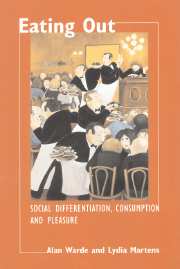Book contents
Part IV - Enjoyment: the attractions of eating out
Published online by Cambridge University Press: 22 September 2009
Summary
Western, capitalist and especially Protestant cultures have a long history of ambivalence towards consumption (Hirschman, 1982; Schama 1987; Sombart, 1967). Consumption smacks of luxury, waste, unnecessary expenditure, self-indulgence, excess. Antithetical to the puritan virtues of work and thrift, consumption is morally suspect. Campbell (1987) detected a paradox. Capitalist development required that some people, even if not the early Protestant entrepreneurs, purchased and used the increasing number of items produced. To generate the expansive material culture of modernity required an urge to consume as well as an urge to accumulate, a Romantic as well as a Protestant ethic. The urge to consume is now well established, as observations about wants being unlimited imply.
In Campbell's view it was the replacement of a traditional with a modern hedonism which explained the continual transformation and extension of consumption norms. No longer was the search for fulfilment simply a matter of seeking maximum repeated exposure to known pleasures, but had become a matter of imagining and anticipating novel and ever more stimulating gratifications. Modern hedonism thus instilled the inevitability of disappointment, for this is an attitude which depends upon the endlessly renewed quest for more rewarding, more exquisite, more self-enhancing experiences.
Hedonism is increasingly identified with consumer culture. Spending money, rather than wasting time or indulging sensual desires, characterises its contemporary form (Cross, 1993; Schor, 1992). However, consumerism is not simply an expression of hedonism. Much consumption is simply routine.
- Type
- Chapter
- Information
- Eating OutSocial Differentiation, Consumption and Pleasure, pp. 163 - 168Publisher: Cambridge University PressPrint publication year: 2000



